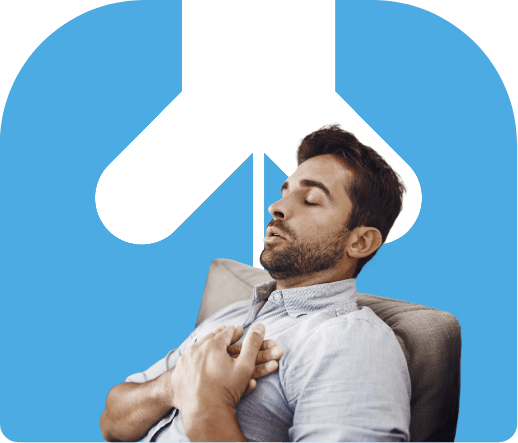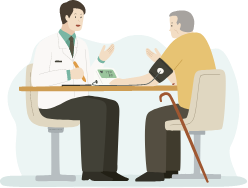Living with A
Lung Condition?

Living with a lung condition can often seem challenging, but it can be assured that you can live a fulfilling life. With a few changes in your lifestyle and habits, you can help your body in its journey towards recovery, or stabilize your lungs’ health to go about work and life. Yes, there are a few restrictions involved, but with a vigilant approach, you can still experience most of the finer things in life. Below are few changes that must be implemented to live a healthy life with an ongoing lung condition.

The best decision you can make for healthy lungs and curing your lung disease is to quit smoking. If you are a regular smoker and need assistance in quitting, there are several professional organizations willing to help. A nicotine detoxing program will ensure that you do not suffer from the effects of withdrawal while restoring your respiratory system’s health. We do not recommend quitting ‘cold turkey’ with an ongoing lung condition since the effects on your respiratory health may be adverse. Instead, take a step-by-step approach with the help of your specialists and rehabilitate yourself on your journey to going smoke-free.
The basic premise of healing a lung condition is to not over-exert or strain your body in a way that it runs out of oxygen. Lung conditions dis-balance the rate at which your lungs can provide fresh oxygen to your body. There are a few gentle exercises that can help you slowly restore your condition to healthy lungs. Most of these focus on improving your stamina and lung capacity. If you suffer from lung conditions, aerobic exercises and heavy activity cannot repair damaged lungs. Instead, breathing exercises like diaphragmatic breathing and pursed-lip breathing can help you slowly increase your air intake capacity.


If practiced regularly, yoga asanas can assist patients with lung condition to refine their breathing patterns. These asanas lengthen the process of inhalation and exhalation, thereby improving the condition of the lung muscles. You can improve lung health condition by regular medication for lung disorders such as cough and cold, asthma, sinus, and post-COVID-19 lung damage, etc. Practice the following yoga asanas every day to receive their full benefits:
It may feel discouraging to live with lung disease, but you can accelerate your healing journey by changing what you eat. By avoiding oily and excessive spices, your body can help heal any cough and phlegm production that aggravates your lung condition. Do away with cold foods like curd, ice cream, bananas, and so on. Cutting out excessive sodium, dairy, processed foods, and fried items has shown a significant improvement in the recovery of lung condition patients across multiple age groups.
Instead of these items, try adding items like apples, berries, walnuts, broccoli, cayenne pepper, garlic, and flaxseeds. These are rich in antioxidants and help in detoxing your lungs quickly, especially if you’re a recovering smoker. Ingredients like garlic and cayenne pepper are vital to improving blood purification to ensure your lungs receive all the support while healing. The world of herbal medicine has several natural roots, leaves, and barks to promote healthy lungs. Try to inculcate these herbs into your daily routine to help treat lung conditions.


Living with a lung condition can take some getting used to, whether it is temporary or terminal. We have noticed that many patients try to push their luck by embarking on all the activities they previously could do. However, take the time to ease up and support your recovery for a set of healthy lungs. Here’s what you can do to make lifestyle changes, bit by bit:
Some patients with lung condition advance slowly and can live a normal life with some lifestyle changes. If you are diagnosed with a lung condition, the first step to maintaining lung health is to consult your specialist to take better care of yourself. This can involve a routine with healthier eating habits, avoiding pollutants, change of place to a less triggering location, and the use of medicines/medical devices. The new wearable technologies can assist patients with lung diseases across multiple degrees of severity; by monitoring their lung health and levels to ensure they remain vigilant. It can help them accomplish normal life tasks.


Lung diseases and conditions can create a substantial impact on your daily life in a myriad of ways. For starters, heavy exercises and strenuous activities may become exceedingly difficult. Living around dusty, polluted, and pollen-ridden locations may cause a decline in lung health and aggravate the condition. Also, a patient’s overall blood oxygen levels may drop due to the limitations of lung function. Seeking treatment can help alleviate these effects and reduce the impact on a lung condition patient’s daily life.
If you or someone you know has been diagnosed with a lung disorder, infection or condition, the primary approach would be to first visit your physician. Upon inspection and assessment, they may refer you to a specialist for further tests. Once an accurate diagnosis has been formed, the specialists will do everything they can to either treat your condition, slow down the lung damage, or rejuvenate lung health.

© 2026 Healthy Lungs.